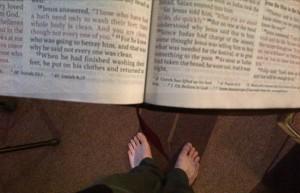Maundy Thursday
Every year, Maundy Thursday offers an opportunity for a different style of preaching and worship. On more than one occasion we have held Tenebrae services – gradually extinguishing the lights in the church as the service progresses, and then leaving the church in silence when the service concludes. We have celebrated a ‘messy communion’ -with wine stains and breadcrumbs littering the table cloth. We have used found materials when the church was a building site to make crosses and present them as an offering. Last night – the emphasis was on simplicity.
_________________________________
Almost two centuries ago, three stargazers left their home in Persia for a small corner of Judea. Arriving at the royal place, they discovered it was the wrong place, and allowed the star which had been their companion to urge them on. Reaching a stable, they fell on their knees, all dignity lost, and worshipped the infant king. For years afterwards, in their native land, the story of that night would be told, and told again. Death came, these wise old men were buried and laid to rest, Later their bones would be removed from where they lay and taken from there to Constantinople, to Milan and eventually to Cologne. There they would be encased in a casket of the finest gold, and find their resting place in a cathedral which soared some 157m above them.
Why do we love to complicate things?
In Judea once again, the night would come when Christ would sit at a borrowed table in an upper room, drinking from borrowed cups with his friends. One cup would be lifted and he would talk of it as the ‘cup of the new covenant’, before passing it to his friends. Centuries later, that cup has been reproduced, beautified and adorned beyond all recognition. In cathedral treasure chambers all across Europe we can find it, fashioned from burnished gold and encrusted with jewels as big as boiled sweets.
Why do we love to complicate things?
Some time in the thirteenth century, British monarchs started dispensing warm clothes and other bounty to the poor on Maundy Thursday as a nod to the humble act of Christ in washing his disciples’ feet. By the sixteenth century the number of poor thus blessed was the number of years of the sovereign’s life. By the eighteenth century royalty could no longer bear to be seen touching the poor, and by the nineteenth century money had replaced all the gifts that had gone before. Now a number of worthy people, their number the same as the sovereign’s years, receive two small leather purses on Maundy Thursday. One is red, and contains Maundy money, the other is white and contains ordinary coins.
Why do we love to complicate things?
This was the point during the sermon at which I removed my shoes and socks, and encouraged others to do the same (many did). Standing there barefoot, feeling the prickle of the church carpet under foot – we all looked slightly ridiculous – robbed of some dignity. This tactile experience was a reminder that Christ never saved a poet or scientist; never a lawyer or a teacher; never a Baptist Minister, for that matter. He saved sinners – united by their common and flawed humanity. We shared communion thus (un)shod – passing the elements to each other with simple eye contact and the words “this is for you”.
Altogether it was a profound and simple experience.

Words and deeds
We closed the service with the haunting sounds of “I exalt thee” from the Willow Creek Community. When you start the video below I suggest you close your eyes – since the sound, rather than the images, are what matter here.
